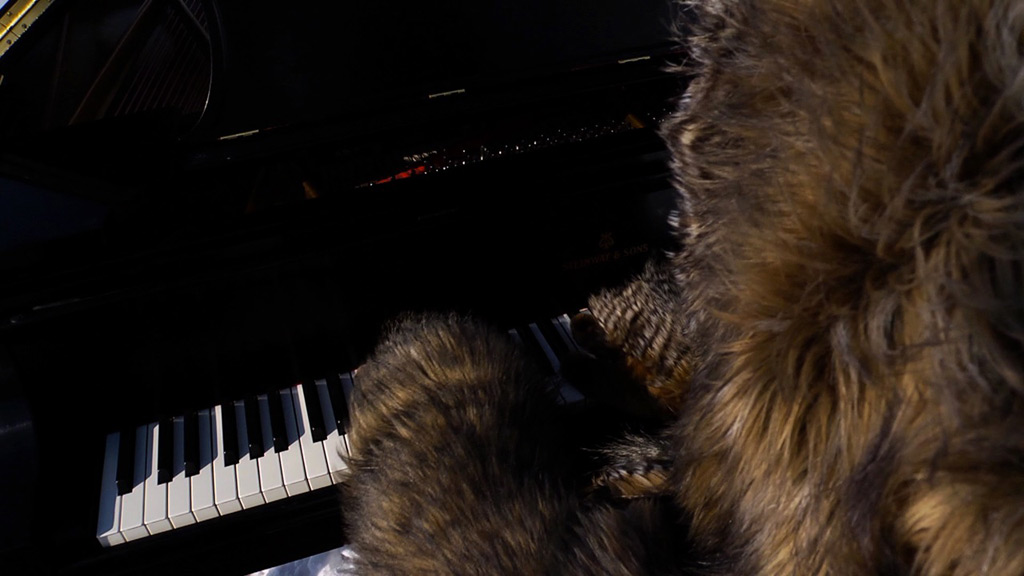Robert Schumann: Romanze, from Drei Romanzen, Opus 28, No. 2, F Sharp Major, 1839, ed. G. Henle Verlag ed. Von Irmer
Schumann was infatuated with Clara Wieck from the day he saw her. He moved into her father’s house in 1834 to be near her. She was beautiful, fifteen, and the most talented woman pianist in history, who paved the way with a career built on grief for Clara Haskil, Elisabeth Leonskaya, Yuja Wang, Alicia de Laroccha, Hélène Grimaud, and a world to follow.
Schumann had written many of his pieces incorporating his “Clara” theme, four descending notes.
Schumann’s second Romance begins with the Clara theme, upside down, in the second measure. It was written during their early, insecure courtship, during the lawsuit from Clara’s father and just before Clara turned 21 and was allowed to marry without her father’s consent. Schumann had written his great Fantasy the year before, and in the year of the marriage, 1840, his Liederjahr, he would wrote 168 songs. But in 1839 he would travel to a distant city and hide in a café to be able to see Clara for a few minutes after one of her concerts, where a backstage guest once said to him, “And are you a musician, too?”
But it was before their children, before his exhaustion, before his syphilis. It was before he lost hope in his greatness, while writing greater and greater pieces. It was in his golden era, when everything was before him and Clara.
Even so, it is a very unrhythmic waltz, a paean to Vienna which he had just visited, filled with defeat (he had failed to expand his magazine). Viennese children would dance to waltzes under the bandstand in the summer sunset, I used to do it myself in that slanted light, where the evening bugs are suspended in amber. Whether from the inability of the musical form to satisfy the images of elegance it conjures up, or from the loss of the summer, the loss of the day, or even the loss of youth, this small waltz is suffused with a vaster metaphor.
So in a way Schumann’s Romance is an elegy. Knowing what later happened to Vienna and Weimar, the coming of the wars, the loss of innocence, what happened to Robert and Clara, what happened to Johannes and Clara, I wonder if Schumann didn’t intuit all this in his short waltz, with its modernist midsection in the complicated key of G Sharp Minor, its aching Clara motif of not just four, but seven descending notes, and its tortured chromatic progression back to the main theme.
Artists have a finely tuned sense of worlds spinning out of control. T. S. Eliot’s The Love Song of J. Alfred Prufrock is a major example. Several weeks before September 11th, 2001, I was made vastly uneasy by a concert in Aspen, and wrote a poem about it. I include this poem with its background below; its premonitory sense of disaster clouds and illuminates Schumann’s Romance as well. Schumann, at his creative and romantic height, looks forward with a sense of doom, although he puts it very politely, in the musical vocabulary of a gentler era.
In the middle of the piece, Schumann’s main theme morphs into a haunted variation where the summer evening’s harmony (in both senses of the word) becomes augmented, a musical technique where chords are stretched into monstrous shapes that connote horror and chaos. Such chords later formed the backbone of horror movie and television music, such as Bernard Herrmann’s Psycho and Twilight Zone themes.
During this short but anxious episode, the Clara theme, upside down, maybe as sign of doubt, is repeated six times, until it emerges triumphant in a major key and is played twice, until it echoes, but again upside down, in the bass, and the small piece throws itself away into the storm light, into loss, and into the opposite of loss: into history.
Henryk Górecki’s Symphony Number 3, the Symphony of Sorrowful Songs, sets to music poems written under the stress of intense persecution. The mood throughout is of planets floating forgivingly in their reassuring orbits around our immense passing execrations. In the brutal contrast between the achievement and the horror of humanity, faith is both lost and found. Matthew Arnold mentions in his poem, Dover Beach, that:
The Sea of Faith
Was once, too, at the full, and round earth’s shore
Lay like the folds of a bright girdle furl’d,
But now I only hear
Its melancholy, long, withdrawing roar,
Retreating, to the breath
Of the night-wind, down the vast edges drear
And naked shingles of the world.
The gassing and mutilation of poets and composers during World War I seemed to spell the end of reason’s influence on Europe. Even before it, Stravinsky’s Rite of Spring had catalogued the cacophony of social chaos descending on the waltzing world. It was not until 1976 that the Polish composer Górecki found the forgiveness to frame the horrors of mankind in the solar wind of music, the endless resting chords of a void in which acceptance coexists with silence.
Staring up at the terrifyingly uncaring but reassuringly beautiful clouds during Aspen’s last concert of the season on August 19, 2001, which featured both the Stravinsky and Górecki pieces performed with all the passion that memory adds by David Zinman and Dawn Upshaw, I wrote the below poem. The president of the festival, Robert Harth, was leaving for Carnegie Hall, and everyone there, musicians and audience, would be leaving utopian Aspen for the possibly less real but more realistic world in large cities, so this last moment was infused with passing and endings. The transience of both joy and sorrow wrenched the lawn from the pathetic fallacy we all treasure, the comforting thought that natural beauty was somehow a visual personification of our own spirit; in its place was something emptier, less easy, less reassuring, but vaster, as if the knowledge that beauty, truth, and reason were placebos, as if that knowledge could somehow free us to float like clouds in the uneven light of our own lives.
GORECKI
endless massing amethyst
between the spreading mist
and sprays of sun
choruses of fatal rain
nestled on the gaseous skin
of wind and clouds
swaying summer crowds
lilting to the horror
of our ceaseless sight
like edges of the squall
unnaturally bright
lit with waves of death
where breaking milling breath
falls
silent in the tranquil spaces
which the evening graces
climb up tone by tone
past the blackened drone
and pleadings of our crimes
sins the sunset mimes
songs our mothers sang
which swing and hang
above the rock bound
earth
the frenzied sound
and crush of birth
and dying
wound and crying
in the scattered sky
the high and racing ceilings
of our useless feelings
sifted through the rays
of monstrous human haze
from the floating dome
of our incandescent
broken home


